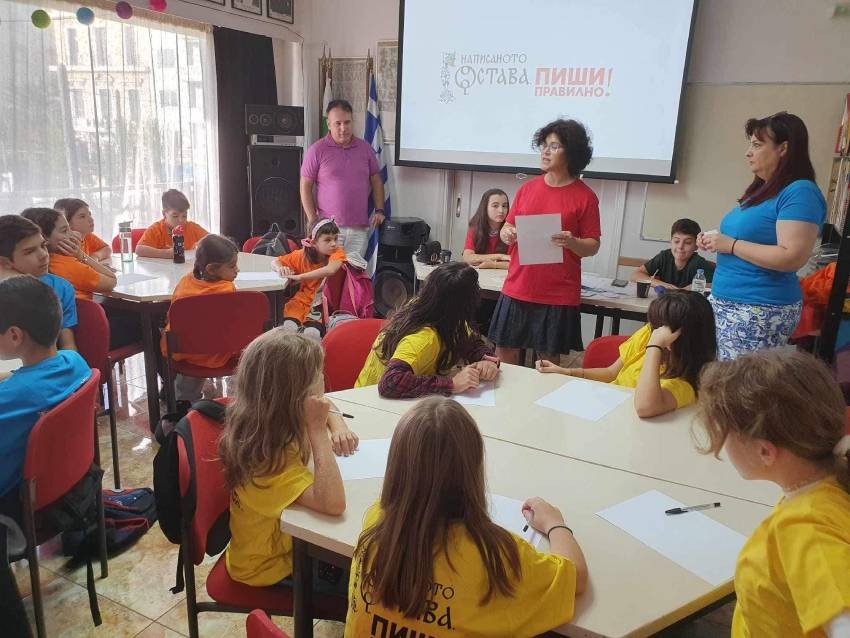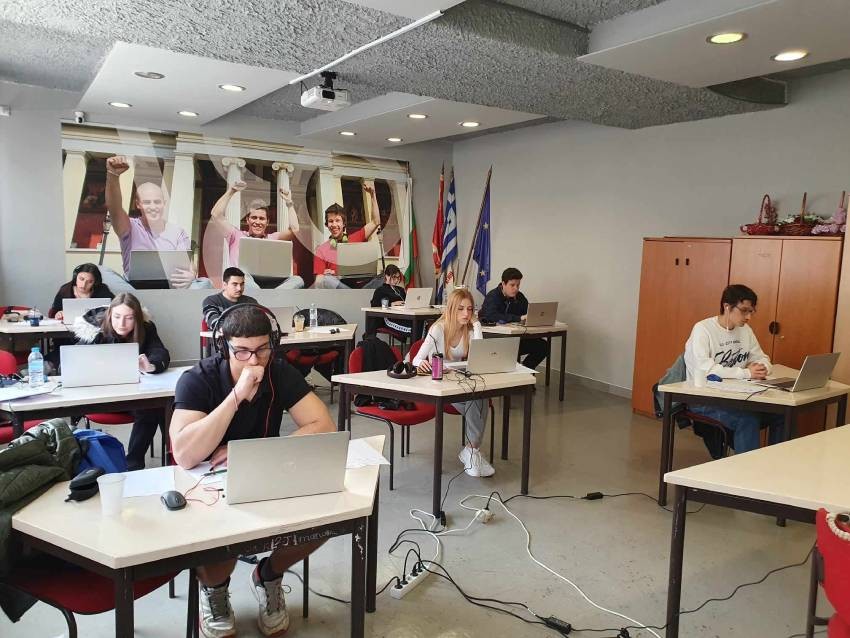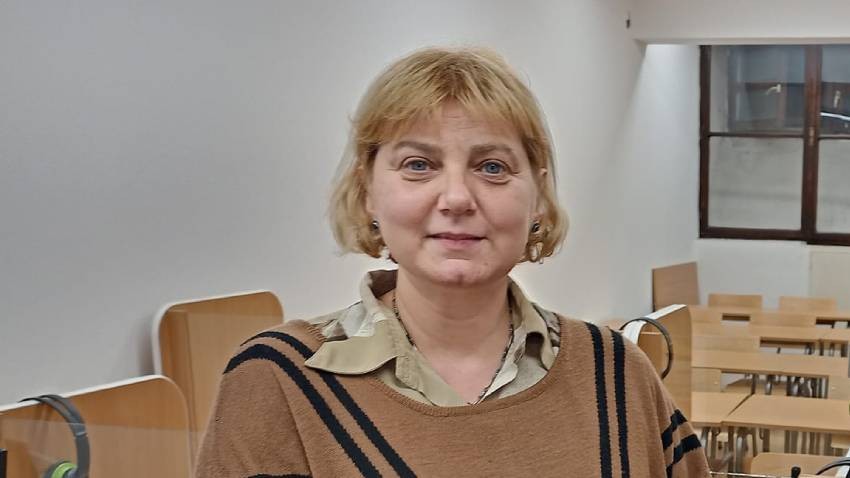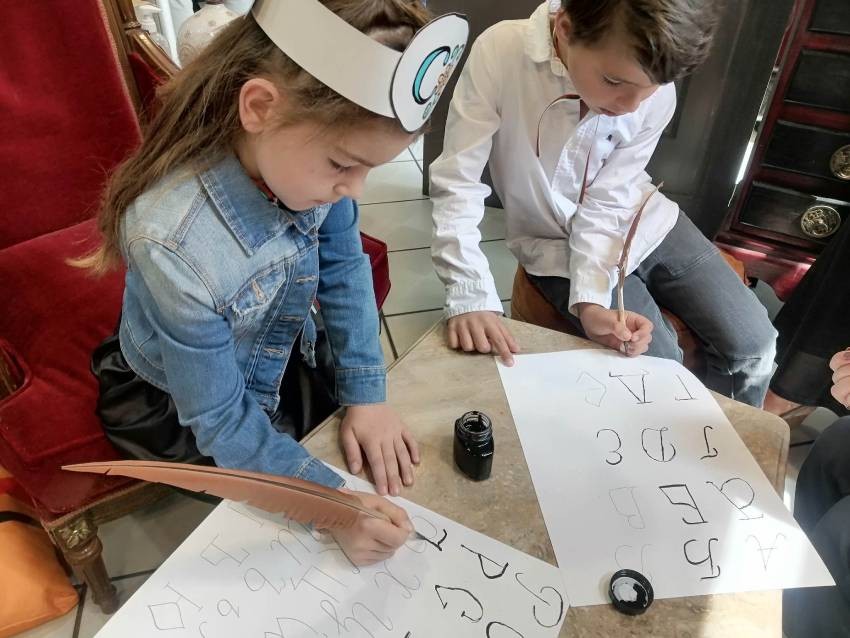On 11 May, the day on which the Christian Orthodox church honours Saints Cyril and Methodius, an international scientific forum will take place in Athens called “The way of light”. The event is dedicated to Cyril and Methodius and their disciples, and Bulgaria’s role in preserving and popularizing the Cyrillic alphabet. It is organized by the Bulgarian Academy of Sciences’ Cyrillo-Methodian Research Center, the Institute for Bulgarian Language Prof. Lubomir Andreychin, the Paisii Hilendarski University of Plovdiv, and the Association of Bulgarian Schools Abroad. The choice of venue is no coincidence – the meeting will give the start to the celebrations of the 20th anniversary of the first Bulgarian Sunday school in Athens, Greece – the Saints Cyril and Methodius. The forum aims to popularize the Bulgarian language and culture outside the country via the Bulgarian Sunday schools, and by presenting the life and work of the patron saints of Europe and the men who continued their work.
On 10 May, the Institute for Bulgarian Language Prof. Lubomir Andreychin is organizing a dictation “The written word remains. Spell correctly!” There will also be a calligraphic workshop, where children will be able to master the art of calligraphy in the Cyrillic as well as in the Glagolitic alphabet. Another creative endeavor is on the agenda as well – My eulogy of the holy brothers with a drawing. The forum on 11 May will be moderated by Assoc. Prof. Adriana Lubenova from the university in Plovdiv, who will also head the creative initiatives.
“Preserving the Bulgarian language is a very important factors for preserving our national identity outside the country,” Assoc. Prof. Adriana Lubenova says in an interview with Radio Bulgaria. “According to unofficial data, there are around 3 million Bulgarians living outside the bounds of Bulgaria at the moment, and there are second and third generation Bulgarians being born abroad within the so-called new emigrant communities. The language, though it does not bear national identity as such, is a key element in acquiring such an identity. Because when you know the language and the culture of a given country, then you can identify as part of it. We conducted a survey, the results of which will become known at the end of June, but what is clear is that many of the children born outside Bulgaria also identify as Bulgarian. They give a dual nationality – that of the country of residence, and of Bulgaria.”
Assoc. Prof. Adriana Lubenova herself has a bicultural background. She was 15 when her family emigrated to the US where she graduated from secondary school and then from university. In 2006, after spending 16 years overseas, she decided to return to Bulgaria and to devote herself to scientific work. She is now a member of the board of the Association of Bulgarian Schools Abroad, and, being a lecturer at the Paisii Hilendarski University in Plovdiv, she has embraced the cause of the education of Bulgarian children living in other countries. The international scientific forum in Athens is the second such event co-organized by the university of Plovdiv, after a forum on innovative teaching methods in Bulgarian Sunday schools abroad, held in Lisbon in mid-March.
On 11 May in Athens, alongside representatives of a number of research institutes and universities in Bulgaria, there will be lecturers who are prominent researchers into the work of the saints Cyril and Methodius, says Assoc. Prof. Adriana Lubenova and goes on:
“Prof. Konstantinos Nichoritis, Doctor Honoris Cause of the St. Kliment Ohridski University of Sofia, will be in attendance, and will talk about Cyril and Methodius, about their work as missionaries and educators, and about the rescue, by Bulgaria, of their followers. Another participant from abroad is Prof. Vanja Stanisic from the University of Belgrade, Serbia, who will talk about the Latinization of the Cyrillic alphabet. Because there are processes underway everywhere, in which the language is gradually being lost. Many imported words are entering the Bulgarian language. I mean no disrespect, but the young generation’s written culture is deteriorating. Writing by hand is a must, it has been proven that the earlier children start writing, this develops hand movements but also the mind. Handwriting affords an opportunity to make sense of the text, and challenges absolutely all senses so the information can be comprehended and reproduced.”
Assoc. Prof. Adriana Lubenova believes it is time Bulgaria created its own international cultural institute, along the lines of the Spanish Institute Cervantes or the German Goethe Institute, an issue that was raised over 10 years ago by the Association of Bulgarian Schools Abroad. Vice President Iliana Iotova has also been lobbying for such a Bulgarian cultural institute. She is patron of the event in Athens, which will take place in media partnership with the BNR’s Radio Bulgaria.
“I hope this forum in Athens will be a step towards the popularization of the work of the holy brothers – Cyril and Methodius. They brought the light of knowledge to many nations, that is why the forum is called “The way of light”, says in conclusion Assoc. Prof. Adriana Lubenova, and adds that she hopes the event will help bring recognition for Bulgaria’s contribution to world culture and to the popularization of the Bulgarian language in the world.
Photos: courtesy of Adriana Lubenova, Facebook/ Bulgarian Sunday school Cyril and Methodius
October 17, 2025 will go down in history as the date on which the Minister of Culture of Hungary presented the document with which the Tradition of Bulgarian Gardening in Hungary officially entered the UNESCO National Register of..
The center of Bulgaria's town of Asenovgrad is today turning into a colorful scene of flavors, aromas and traditions, in which the spirit of the Red Wall Biosphere Park comes to life , reports BNR's Radio Plovdiv. At the “Festival of Crafts and..
"Folklore is a need for humans and this need will not disappear just like that, " says Assoc. Prof. Dr. Natalia Rashkova - ethnologist and folklorist, university lecturer and researcher with a strong contribution to the study of..
"We cannot escape from modern technologies, but we must think about how we can use artificial intelligence to improve the quality of..
Over 80% of Bulgarians are expected to start using artificial intelligence in the next three years , across all age groups. Today, it is almost..
Serbians around the world mark one year after Novi Sad tragedy On November 1, Serbians abroad will join the call of..

+359 2 9336 661
